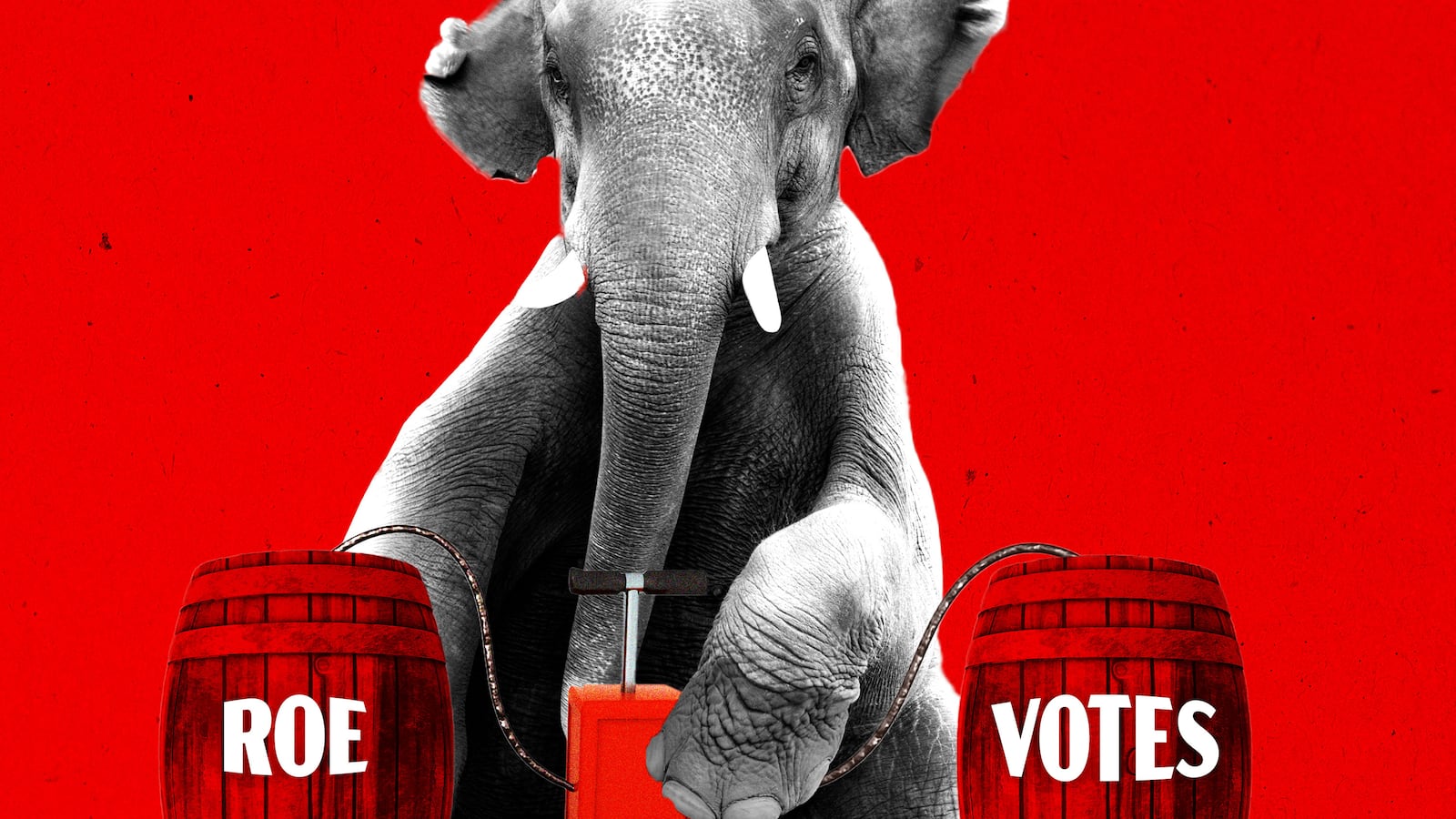Since the Reagan era, the GOP has cynically fanned the flames of anti-choice extremism, without paying a large political price for the deep unpopularity of that position.
Those days are over, with a Trump-packed Supreme Court supermajority on the cusp of overturning Roe v. Wade—and with it a fundamental right that most Americans support.
The highest price for this unprecedented nullification of civil rights will, of course, be paid by the millions of Americans who stand to lose their reproductive autonomy.
But the political price to be paid by the GOP for engineering such a hugely unpopular judicial action in the service of the party’s “culturally conservative” base could also be extraordinarily high.
In 1980, Ronald Reagan enticed the then-nascent religious right to join his political coalition by becoming the first presidential candidate to become a full-throated advocate for the overruling of Roe.
Reagan was not an obvious choice to serve as the hero to culturally conservative Catholics and evangelicals. (This was particularly so, given that his opponent, Jimmy Carter, was probably the first avowedly evangelical president.)
A divorced former Hollywood actor, Reagan as governor of California had signed a bill liberalizing the state's abortion law, and he was largely associated with the near-libertarian politics of Sen. Barry Goldwater.
But during the 1980 campaign, Reagan advocated for a constitutional amendment outlawing abortion. That move cemented the rock solid alliance between the GOP and newly politically engaged right-wing Christians—many of whom came to be labeled Reagan Democrats—because Reagan’s “cultural” positions enticed them to switch parties.
From the outset of this alliance, however, the GOP had a fundamental problem. While the anti-choice position was essential to attracting Christian conservatives to the Republican Party—it was not popular among most voters.
Indeed, over the succeeding decades when the GOP became ever more associated with anti-choice extremism, a majority of Americans have consistently remained pro-choice, with about 59 percent of adults believing that abortion should be legal in most circumstances. In fact, they’ve come to take reproductive rights for granted. Many observers (including Sen. Goldwater in 1992) have long recognized the Republican Party was putting itself in a precarious position by standing in opposition to a majority of voters on a critical issue.
The fact that the GOP’s opposition to reproductive rights is critical to retaining its base, while being at odds with the views of the majority of voters, has always posed a potential political land mine for the party. It is one, however, that Republicans have managed to avoid setting off—due to a combination of cynicism on the part of politicians and the savviness of allies on the Supreme Court.
Reagan and George H.W. Bush had together named five justices to the Court by 1992. That year, it appeared that the Court was poised to achieve the long-stated GOP goal of overruling Roe—and paving the way for the re-criminalization of abortion—when it ruled on a case challenging abortion restrictions signed into law by Pennsylvania’s anti-abortion Democratic Gov. Robert Casey.
But the nation was surprised when three justices nominated by GOP presidents —David Souter, Anthony Kennedy, and Sandra Day O’Connor—signed an opinion upholding abortion rights in the Casey case. The opinion was grounded on the principle of “stare decisis,” a pseudo-Latin legal term meaning respect for existing judicial precedent.
The three justices reasoned that voiding Roe would be profoundly unfair to women who had come to rely “on the rule’s continued application.” They also stated that overruling a “watershed decision…on which the Court staked its authority in the first instance” could appear to be a “surrender to political pressure,” and thereby place the Supreme Court’s own legitimacy at risk. Accordingly, they settled to watering down Roe by announcing a new standard for reviewing abortion restriction laws, called the “undue burden test.”
Justice O’Connor, who had served as a state legislator and was particularly attuned to the political implications of the Court’s decisions, was likely the prime mover behind the Casey compromise, which had the brilliant effect of protecting GOP politicians from the potentially catastrophic political consequences of their own anti-choice extremism.
By declaring that overruling Roe was not on the table, the Court signaled to GOP politicians that they could continue to demand the end of reproductive rights—and to demonize the Supreme Court for failing to do so—while remaining secure in the certainty that Roe would remain in place. This allowed the GOP to win anti-abortion rights voters, without facing wrath of the majority of America.
That state of affairs, however, was never a stable one. As GOP politicians continued to rail and campaign against the Supreme Court, the party’s right-wing base increasingly insisted on populating the Court with true believing jurists who could be relied upon to void Roe.
George W. Bush appointed two reliably right-wing jurists to the Court, including Samuel Alito, who authored the recently leaked draft decision that would overturn Roe. But the Court’s turning point was the Trump presidency.
Like Reagan, Trump was a divorcee and a former Democrat, and thus an unlikely champion of right-wing Christian activism. But Trump managed to clinch the GOP nomination in 2016 in part by promising to appoint only the most-devoted opponents of abortion rights to the Court. And he definitely fulfilled that promise.
Most notable among them was Amy Coney Barrett. As a right-wing legal scholar, Barrett made a name for herself deriding the Casey decision. She argued that the Court should not give effect to the principle of stare decisis in constitutional cases—stating that she tended to “agree with those who say that a justice’s duty is to the Constitution,” not precedent, reasoning that it is “more legitimate for [a justice] to enforce her best understanding of the Constitution rather than a precedent she thinks clearly in conflict with it.”
The Court—now with a six Justice right-wing majority—this year chose to hear argument on the question of whether Roe should be overruled. And it was unsurprising that most of the Court’s current GOP nominees appeared utterly uninterested in preserving the status quo, regardless of the political consequences.
Nonetheless, the extreme rhetoric of Alito’s draft opinion—such as describing Roe as “egregiously wrong from the start” and suggesting it was “heed[less]” of the Constitution—was somewhat shocking. Furthermore, Alito makes clear that he intends the Court’s voiding of Roe to be a first step in the judicial gutting of other fundamental rights, many of which are likewise increasingly popular, including the civil rights of LGBTQ citizens.
Put otherwise, the religious right extremists that Ronald Reagan cynically pandered to 42 years ago are now in full control of the Supreme Court.
Those citizens who are about to be stripped of their fundamental rights (particularly pregnant persons without financial means), will suffer the gravest and most immediate harm from the GOP-facilitated capture of the Supreme Court by fringe extremists.
But the Republican Party itself stands to, finally, pay a huge political price for the cynical double game it has played for decades.
The GOP has definitively associated itself with the project of voiding the right to choose. Indeed, in anticipation of the upcoming Court decision, a number of Republican-controlled states passed (currently) unconstitutional abortion restriction laws.
Once those laws become effective, the GOP will finally have to confront the fact that its position in favor of voiding a long-established and fundamental right of personal autonomy places the party directly at odds with the majority of Americans, including citizens whose votes the party needs to prevail in upcoming elections. The consequences of the explosion of this long dormant political landmine are difficult to predict, but it could very well blow up in Republicans’ faces.








